Human Rights, Torture, Truth to Power, War Resister
Podcast: Play in new window | Download

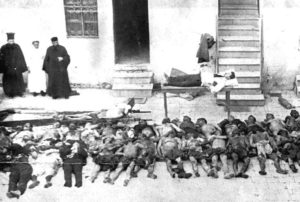
It Was Genocide: Armenian Survivor Stories
Around the world, April 24 marks the observance of the Armenian Genocide. On that day in 1915 the Interior Minister of the Ottoman Empire ordered the arrest and hangings of Armenian intellectuals and community leaders in Constantinople. It was the beginning of a systematic and well-documented plan to eliminate the Armenians, who were Christian, and who had been under Ottoman rule and treated as second class citizens since the 15th century.
The unspeakable and gruesome nature of the killings—beheadings of groups of babies, dismemberments, mass burnings, mass drownings, use of toxic gas, lethal injections of morphine or injections with the blood of typhoid fever patients—render oral histories particularly difficult for survivors of the victims.
Why did this happen? Despite being deemed inferior to Turkish Muslims, the Armenian community had attained a prestigious position in the Ottoman Empire and the central authorities there grew apprehensive of their power and longing for a homeland. The concerted plan of deportation and extermination was effected, in large part, because World War I demanded the involvement and concern of potential allied countries. As the writer Grigoris Balakian wrote, the war provided the Turkish government “their sole opportunity, one unprecedented” to exploit the chaos of war in order to carry out their extermination plan.
As Armenians escaped to several countries, including the United States, a number came to New Britain, Connecticut in 1892 to work in the factories of what was then known as the hardware capital of the world. By 1940 nearly 3,000 Armenians lived there in a tight-knit community.
Pope Frances calls it a duty not to forget “the senseless slaughter” of an estimated one and a half million Armenians by the Ottoman Turks from 1915 to 1923. “Concealing or denying evil is like allowing a wound to keep bleeding without bandaging it,” the Pope said just two weeks before the 100th anniversary of the systematic implementation of a plan to exterminate the Armenian race.
Special thanks to Jennie Garabedian, Arthur Sheverdian, Ruth Swisher, Harry Mazadoorian, and Roxie Maljanian. Produced and written by Heidi Boghosian and Geoff Brady.

Civil Liberties, Habeas Corpus, Human Rights, Supreme Court, Truth to Power
Podcast: Play in new window | Download
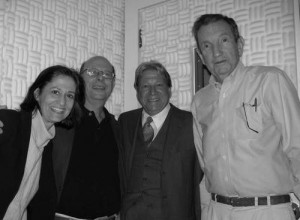
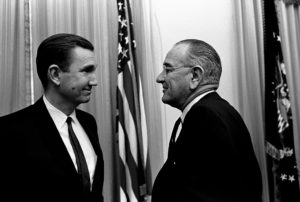
Remembering Attorney Ramsey Clark
Our friend and colleague Attorney Ramsey Clark died in his home in Greenwich Village from complications from a fall last Friday, April 9, 2021. He was 93 years old. He came from a prominent New Deal Texas family. His father Tom Clark had been the Attorney General of United States and then served on the Supreme Court. The Clark family and the Lyndon Johnson family were friends and political allies.
Lyndon Johnson appointed Ramsey Clark to be the US Attorney General. He served in that position for 18 months severely disappointing Johnson who remarked that he thought he was appointing Tom Clark’s son. “I was wrong.“ said Johnson. Clark opposed the death penalty and declared a moratorium on it when he was in office. He opposed wire tapping.
He supported the civil rights movement and helped draft the historic Civil Rights Act of 1964 and 1968 and the Voting Rights Act of 1965. He was a key person empowering federal desegregation orders. At a cabinet meeting he declared his opposition to the war in Vietnam. That was the last cabinet meeting, he told us, that Johnson ever invited him to.
He also disappointed and baffled many on the left when he took up representation of such figures as Shaikh Abdul Rahman, Milosevich and Saddam Hussein. Clark said they deserved competent counsel.
Guest – Attorney Mara Verheyden-Hilliard, with the Partnership for Civil Justice Fund, that is partnering with the newly-formed Center for Protest Law and Litigation, to demand a fully public investigation into law enforcement’s handling of the riot on the Capitol Building on that day that shocked much of the nation.
Guest – Attorney Alan Levine, a law partner of Ramsey Clark’s for five years in the firm Clark, Wulf, and Levine. He worked as an attorney with the New York civil Liberties Union and the Puerto Rican Defense Fund.
Guest – Ralph Nader, one of the nation’s most effective and well-known social critics. He has raised public awareness and increased government and corporate accountability. As a young lawyer in 1965 he made headlines with his book Unsafe at Any Speed, leading to congressional hearings and passage of a series of life-saving auto safety laws in 1966. His example has inspired a generation of consumer advocates, citizen activists and public interest attorneys. Full biography.
Past interviews with Attorney Ramsey Clark
Law and Disorder June 24, 2013
Law and Disorder January 21, 2013

———————————————
Civil Liberties, Criminalizing Dissent, Human Rights, Surveillance, Torture, Truth to Power
Podcast: Play in new window | Download
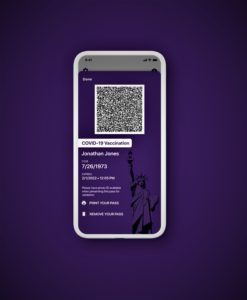

Vaccine Passports, Privacy And Civil Liberties
New York State became the first in the country to premier a Covid-19 vaccine passport. They call it the Excelsior Pass and proponents say it’s a safe and efficient way for people to return to sporting events, concerts, Broadway theaters and other large group settings. You show a QR code proving a recent negative test or full vaccination.
The pass is voluntary and lets New Yorkers upload their official results—from a number of different vaccination sites and labs—into the system to verify that the person holding the pass meets the standards for entry. The state first used the pass at a Buffalo Bills football game in January after which they monitored attendees for 14 days after and discovered “almost negligible” transmission.
Registration in the program requires three pieces of information: Name, date of birth, and zip code. The pass is matched to vaccination and testing records using a series of questions to prevent fraud. When the person arrives at a venue, all they have to do is show a photo ID with their code, which will generate a green check mark at the venue.
New York state officials say they’ve been in close talks with surrounding states about integrating systems, but their neighbors say it’s not the priority. What are vaccine passports and who is considering implementing them? Connecticut, for example says it doesn’t have immediate plans to roll out a vaccine passport, although Governor Ned Lamont has said it’s possible to see private sector solutions if demand grows and if the technology is proven effective.
Guest – Attorney David J. McGuire, executive director of the ACLU of Connecticut. McGuire also is the chair of the Connecticut Special Advisory Committee to the U.S. Commission on Civil Rights, serves on the state’s Racial Profiling Prohibition Project Advisory Board, and is a member of the Commission on Racial and Ethnic Disparities in the Criminal Justice System.
—-
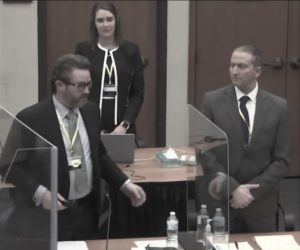
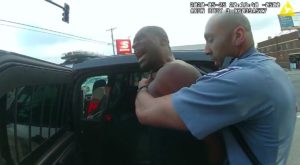
Attorney Flint Taylor : Police Brutality And The Derek Chauvin Trial
The cruel and sadistic police murder of George Floyd last June on a Minneapolis sidewalk was videoed by a courageous 17 year old bystander. Her video was viewed by Americans across the country and the world. It captured Minneapolis police officer Derek Chauvin, smirking, with one hand in his pocket as he knelt for 9 minutes and 29 seconds on George Floyd’s neck. Floyd was handcuffed behind his back and restrained by two other police officers at the time. He begged for his life, called for his mother, and repeatedly said “I can’t breathe!”
Onlookers gathered in protest as the murder progressed but their intersession was of no avail. George Floyd‘s life drained out of him. He lost his pulse. Still Chauvin persisted, kneeling on a dead man. An ambulance came to take away George Floyd’s corpse.
People responded, it was massive and sustained. In some two thousand cities across America 20 million people, white and Black , Black lead, protested in the streets. More than demanding that George Floyd’s killer be brought to justice, they demanded that police departments be defunded, that police be controlled by the community, and that ending police murders of Black people be brought to halt once and for all.
We are now in the midst of the trial of killer cop Derek Chauvin. Millions of Americans are watching the trial. It seems to them that this latest racist police outrage is the culmination of so many past murders. They are asking, what is to be done?
Guest – Attorney G. Flint Taylor is a founding partner of the People Law Office in Chicago starting out over 50 years ago representing the family of Black Panther leader Fred Hampton, Who was assassinated by the Chicago Police Department with the help of the FBI. He has represented numerous police torture survivors during the past 33 years. Taylor was one of the lawyers involved in the struggle for reparations and has chronicled the decade long fight against Chicago police torture in his award-winning book “The Torture Machine : Racism and Violence in Chicago.

—————————————–
CIA Sponsored Terror, Civil Liberties, Crony Capitalism, Habeas Corpus, Human Rights, Political Prisoner, Supreme Court, Surveillance, Truth to Power, War Resister
Podcast: Play in new window | Download
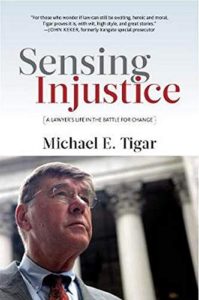

Sensing Injustice: A Lawyer’s Life And The Battle For Change
We are going to spend the entire hour with attorney Michael Tigar to discuss his just published magnificent memoir Sensing Injustice: A Lawyer’s Life And The Battle For Change.
By the time he was 26, Michael Tigar was a legend in legal circles well before he would take on some of the highest profile cases of his generation. In his first US Supreme Court case, at the age of 28, Tigar won a unanimous victory that freed thousands of Vietnam war resistors from prison. Tigar also led the legal team that secured a judgment against the Chilean Pinochet regime for the 1976 murders of dictator Pinochet opponent Orlando Letelier and his colleague Ronnie Moffit in a Washington, DC car bombing.
He then worked with the lawyers who prosecuted Pinochet for torture and genocide. A relentless fighter of injustice, Tigar has been counsel for Angela Davis, Jamil Abdullah Al-Amin (H.Rap Brown). Tigar the Chicago Eight, and leaders of the Black Panther Party, to name only a few. His book is about stories, people stories of injustice, struggle, and sometimes vindication as he put it. Michael Tigar is a magnificent storyteller with a dry wit and a prodigious memory. Monthly Review link to Sensing Injustice
Guest – Constitutional attorney Michael Tigar, professor emeritus from The Washington College of Law and has taught at the University of Texas and Duke University. He has practice before the Supreme Court, arguing his first case when he was 24 years old. Tigar has written or edited more than a dozen of important books including “Law and the Rise of Capitalism.“ He has worked for over 50 years with movements for social change as a human rights lawyer, law professor, and writer. Since 1996 he has practiced law with his wife Jane B. Tigar. Michael Tigar’s blog Tigarbytes.

———————————–
Civil Liberties, Human Rights, Political Prisoner, Prison Industry, Prosecution of the Bush Administration, Supreme Court, Surveillance, Targeting Muslims, Truth to Power, War Resister
Podcast: Play in new window | Download
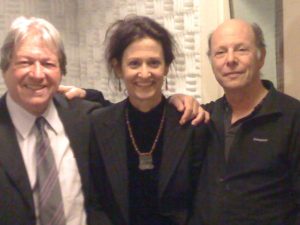
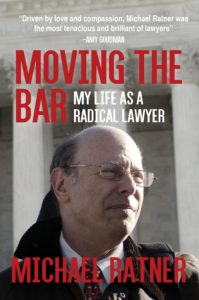
Moving The Bar: My Life As A Radical Lawyer
Michael Ratner’s memoir Moving The Bar: My Life As A Radical Lawyer will be available at OR Books. As listeners know, Michael Ratner was one of the most important civil rights attorneys in our era. He spent his life fighting on behalf of those who state and empire sought to crush, from the leaders of the prison uprising at Attica to Muslim prisoners held in Guantanamo, to Julian Assange.
Michael Ratner (1943–2016) worked for more than four decades at the Center for Constitutional Rights becoming first the Director of Litigation and then the President of what Alexander Cockburn called “a small band of tigerish people.” He was also the President of the National Lawyers Guild. Michae Ratner handled some of the most significant cases in American history. This book tells why and how he did it. His last case, which he worked on until he died, was representing truth-telling whistleblower and now political prisoner Julian Assange, the editor of WikiLeaks. Ratner “moved the bar” by organizing some 600 lawyers to successfully defend habeas corpus, that is, the ancient right of someone accused of a crime to have a lawyer and to be brought before a judge. Michael had a piece of paper taped on the wall next to his desk at the CCR. It read:
Four Key Principles Of Being A Radical Lawyer:
1. Do not refuse to take a case just because it is long odds of winning in court.
2. Use cases to publicize a radical critique of US policy and to promote revolutionary transformation.
3. Combine legal work with political advocacy.
4. Love people.
We hear interviews about Michael Ratner with Chris Hedges’s show On Contact, Attorneys Eleanor Stein, Richard Levy and David Cole.

————————–
CIA Sponsored Terror, Civil Liberties, Truth to Power
Podcast: Play in new window | Download
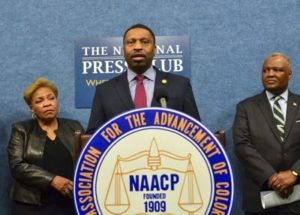
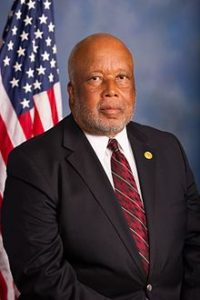
The 1871 Anti-Klan Act And The NAACP Lawsuit
Black Mississippi Congressman Benny Thompson with the support of the National Association for the Advancement of Colored People (the NAACP) last month sued former president Donald Trump, his disgraced lawyer Rudy Giuliani, the fascist group Proud Boys, and the Oath Keepers, a far right organization of ex-military and policemen.
Thompson used the 1871 Anti-Klan Act as a basis for his lawsuit. He alleges that there was a conspiracy between Trump and the other defendants to stop Congress from doing its business when Trump incited the January 6, 2021 ransacking of the Capitol.
The 1871 Anti-Klan Act was passed for precisely this purpose. 150 years ago, six years after the conclusion of the Civil War, the southern losers who wanted to keep slavery in another form, formed the Ku Klux Klan to murder, terrorize, and harass Black people for registering to vote, voting, running for office or performing their duties after getting elected.
The launching of this lawsuit is an extremely positive development. It’s chances of success would be increased exponentially if the fight was extended beyond the courtroom and masses of people were mobilized behind it. This is a lesson to be learned from Attorney Michael Ratner.
Guest – Black rights and socialist activist Malik Miah, an advisory editor for Against the Current magazine and a regular contributor to the Australian newspaper, “Green Left Weekly”. Malik Miah is a retired airline mechanic and trade unionist at United Airlines in San Francisco.
—-


Ross Ulbricht: Petition For Clemency
Seven years ago a NY jury found Ross Ulbricht guilty on charges related to operating the Silk Road website. The site was a Tor-hidden site, and used Bitcoin, triggering an all-out FBI search to determine the operator’s identity. The 29-year-old convicted on seven charges, including a kingpin charge, and Judge Katherine Forrest imposed two life sentences and 40 years without the possibility of parole, for the young, nonviolent and first-time offender.
The sentence was far longer than prosecutors sought. The website sold, among other items, illicit substances. Ross wasn’t convicting of selling illegal drugs but rather of creating an e-commerce website that others elected to use for that purpose. At trial, no victims were named; rather rampant corruption, abuse, evidence tampering and several violations of Ross’s rights cast doubt in the legal and technology communities on both the conviction and the extraordinary sentence.
In the 2016 appeal, defense attorneys presented a litany of improprieties in the investigation and the trial itself. One of the consequential of these was the court precluding information about two corrupt federal agents investigating Silk Road who were sent to prison on corruption charges. The Supreme Court refused to consider the case. So supporters spent the past four years preparing to petition Donald Trump for Clemency.
Guest – Ross’s mother, Lyn Ulbricht joins us to talk about a petition for clemency to President Donald Trump. Free Ross Ulbricht.

—————————————–
















